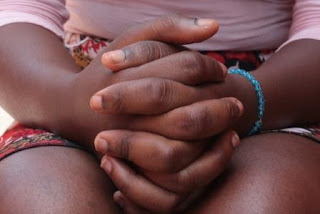September 28 is the Global Day of
Action for Access to Safe and Legal Abortion. The day has its origin in Latin
America and the Caribbean where women’s groups have been mobilising around
September 28 over the last two decades to demand their government to
decriminalise abortion, to provide safe and affordable abortion services and to
end stigma and discrimination towards women who have abortion.
Over the years, the discussion on
access to safe and affordable abortion services have advanced in global
advocacy spaces for the health, rights and well being of girls and women. But
what does this mean to young girls in Ghana?
I recently lead a group discussion
among young people between the ages 10-24 in the Teshie and Nungua communities
in the Greater Accra region of Ghana to gather statistics and other evidence on
the Sexual and Reproductive Health and Rights (SRHR) and Maternal Health
challenges among young people on the CSE4All project with support from Women Deliver and the findings are revealing.
 Nationally, among adolescent young
girls in Ghana, 3 out of 5 pregnancies are unplanned, and 16 percent of all
abortions occur among girls between the ages 15-19 as described by the Demographic Health Survey 2014.. The situation may vary from
community to community but it is more disturbing for young people in these
communities.
Nationally, among adolescent young
girls in Ghana, 3 out of 5 pregnancies are unplanned, and 16 percent of all
abortions occur among girls between the ages 15-19 as described by the Demographic Health Survey 2014.. The situation may vary from
community to community but it is more disturbing for young people in these
communities.
It is quite disturbing that despite
the successes in ensuring the health, rights and wellbeing of women, girls and
all as supported by the International Human Right declarations and the global
development agenda, many girls and women continue to be shamed for accessing
safe abortion services.
Two years after she had an abortion,
the 19 year old cannot publicly participate in discussions on SRHR or maternal
health. For her, the stakes are high for yet another ridicule or shame. She
still goes through stigma among her female counterparts and boys/men alike. “Until now, I never thought I could
share my experience but I am doing this for other young girls reading to learn
from me. I am sharing my story because, it will save lives.” She says.
For Teki, a 20 year old mother of a 5
year old son, it is easier for girls in her age group to receive post-abortion
care at the health centres than comprehensive abortion care services.
For many young girls like her, the
fear of counselling and the experience with some health workers who may stand
in their way to safe services due to lack of training, poor attitudes of health
workers towards them, affiliations with faith and their rights to privacy and
confidentiality against the community who already ridicules them for being
pregnant at a young age.
 A quick way out in such dilemma is
to mix herbs, broken bottles and other known harmful ways of abortion out of
desperation and they mostly end up in the health centres when complications get
critical.
A quick way out in such dilemma is
to mix herbs, broken bottles and other known harmful ways of abortion out of
desperation and they mostly end up in the health centres when complications get
critical.
This is where health workers work
round the clock to save the situation without any of the earlier
challenges/fears expressed by Teki.
With coverage from the national
health insurance, professionalism of health workers to save the situation in a
supportive environment by all, “young girls will always prefer to visit the
health centre with complications if things do not change”. She added.
The question however remains, who
changes what?
The law on
abortion in Ghana clearly states the legal indications under which abortion is
permitted as stated in the criminal offences Act 1960 (ACT29) section 58 to
section 59 as;
(i) When the pregnancy stands as a risk to the life or injury to the physical or mental
health of the woman.
(ii) When conception was a result of rape,
incest, defilement of Mentally Challenged woman.
(iii) When there is a substantial
risk that foetus has or will have serious abnormality or disease
Legally, girls and young women have the
rights to access safe abortion services, health workers are protected legally
as well as by standards and protocols in the health system however attitudes,
beliefs and society’s outlook on abortion continue to change gradually.
Perhaps if we critically examine the issue
with a public health lens, preventing the severe complications and injury that
many young girls go through today and be less judgmental, provide more
education on their SRHR. The global discourse on safe abortion services will
impact and save more lives
“Some
girls deliver like I did, but others have abortions using all sorts of herbs.
They don’t have a choice because their partners (the men/boys) and the
community pressure them to do it.”-Teki
And
perhaps, the situation shared by Teki , will improve.


No comments:
Post a Comment